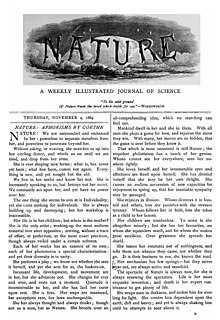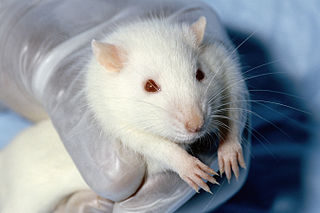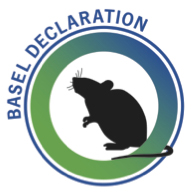
In academic publishing, a scientific journal is a periodical publication intended to further the progress of science, usually by reporting new research.

Animal welfare is the well-being of nonhuman animals. The standards of "good" animal welfare vary considerably between different contexts. These standards are under constant review and are debated, created and revised by animal welfare groups, legislators and academics worldwide. Animal welfare science uses various measures, such as longevity, disease, immunosuppression, behavior, physiology, and reproduction, although there is debate about which of these indicators provide the best information.
The Science Council is a UK organisation that was established by Royal Charter in 2003. The principal activity of The Science Council is the promotion of the advancement and dissemination of knowledge of and education in science pure and applied, for the public benefit. The Science Council is the Competent Authority with respect to the European Union directive 2005/36/EC.
The Royal Academies for Science and the Arts of Belgium (RASAB) is an association which promotes and organises science and the arts in Belgium by coordinating the national and international activities of its constituent academies such as the National Scientific Committees and the representation of Belgium in international scientific organisations.

The SIB Swiss Institute of Bioinformatics is an academic not-for-profit foundation which federates bioinformatics activities throughout Switzerland.

The Association for Psychological Science (APS), previously the American Psychological Society, is an international non-profit organization whose mission is to promote, protect, and advance the interests of scientifically oriented psychology in research, application, teaching, and the improvement of human welfare. To this end, APS publishes several journals, holds an annual meeting, disseminates psychological science research findings to the general public, and works with policymakers to strengthen support for scientific psychology.

The Mexican Academy of Sciences(Academia Mexicana de Ciencias) is a non-profit organization comprising over 1800 distinguished Mexican scientists, attached to various institutions in the country, as well as a number of eminent foreign colleagues, including various Nobel Prize winners. The organization, which encompasses exact and natural sciences as well as the social sciences and humanities, is founded on the belief that education, based on the truth of scientific knowledge, is the only means, in the short and long term, of achieving the development of the Mexican spirit and national sovereignty.
Animal law is a combination of statutory and case law in which the nature – legal, social or biological – of nonhuman animals is an important factor. Animal law encompasses companion animals, wildlife, animals used in entertainment and animals raised for food and research. The emerging field of animal law is often analogized to the environmental law movement because "animal law faces many of the same legal and strategic challenges that environmental law faced in seeking to establish a more secure foothold in the United States and abroad".
The International Union of Forest Research Organizations (IUFRO) is a non-profit, non-governmental international network of forest scientists, headquartered in Austria.
The American Institute of Biological Sciences (AIBS) is a non-profit scientific association that is dedicated to advancing biological research and education.
The Swiss Nanoscience Institute (SNI) at the University of Basel is a center of excellence for nanosciences and nanotechnology. In the SNI network, interdisciplinary teams of scientists conduct basic and applied research and actively support knowledge and technology transfer to industry. Within the study of nanoscience and the PhD School, the SNI trains young scientists and prepares them for careers in industry and academia.

The Association for Applied Psychophysiology and Biofeedback (AAPB) was founded in 1969 as the Biofeedback Research Society (BRS). The association aims to promote understanding of biofeedback and advance the methods used in this practice. AAPB is a non-profit organization as defined in Section 501(c)(6) of the Internal Revenue Service Code.
The American Society for Bone and Mineral Research (ASBMR) is a professional, scientific and medical society established in 1977 to promote excellence in bone and mineral research and to facilitate the translation of that research into clinical practice. The ASBMR has a membership of nearly 4,000 physicians, basic research scientists, and clinical investigators from around the world.
The European Association of Urology (EAU) is a non-profit organisation committed to the representation of urology professionals worldwide. All active urology professionals, including urology nurses, are eligible for membership of the EAU.
The Society for Research in Child Development (SRCD) is a professional society for the field of developmental psychology, focusing specifically on child development. It is a multidisciplinary, not-for-profit, professional association with a membership of approximately 5,500 researchers, practitioners, and human development professionals from over 50 countries. The purposes of the society are to promote multidisciplinary research in the field of human development, to foster the exchange of information among scientists and other professionals of various disciplines, and to encourage applications of research findings.

Understanding Animal Research (UAR) is a British membership organisation formed in late 2008 through the merger of the Research Defence Society and the Coalition for Medical Progress. Its main aims are to "explain why animals are used in medical and scientific research. We aim to achieve a broad understanding of the humane use of animals in medical, veterinary, scientific and environmental research in the UK".

The National Association for Biomedical Research (NABR) is an American non profit organization, 501(c)(6), located in Washington, DC. NABR was formed in 1985 when the Association of Biomedical Research merged with the National Society for Medical Research The NABR advocates for the continued use of animals in biomedical research albeit in as humane a manner as possible.
Open science data is a type of open data focused on publishing observations and results of scientific activities available for anyone to analyze and reuse. A major purpose of the drive for open data is to allow the verification of scientific claims, by allowing others to look at the reprodubility of results, and to allow data from many sources to be integrated to give new knowledge. While the idea of open science data has been actively promoted since the 1950s, the rise of the Internet has significantly lowered the cost and time required to publish or obtain data.

EU Directive 2010/63/EU is the European Union (EU) legislation "on the protection of animals used for scientific purposes" and is one of the most stringent ethical and welfare standards worldwide.









